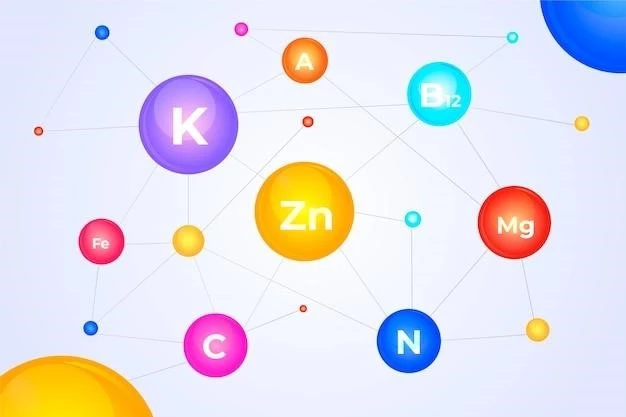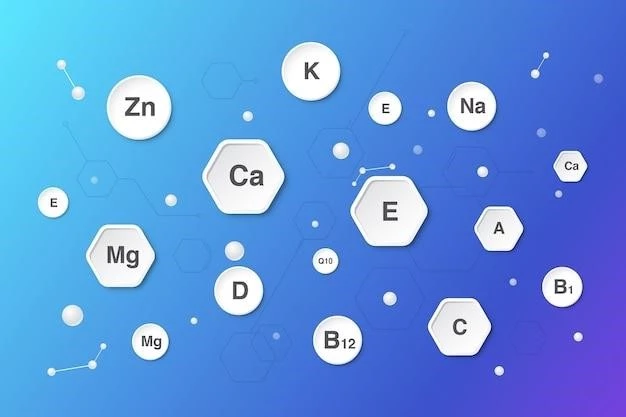Zinc⁚ Uses, Side Effects, and Information
Zinc is a vital mineral that plays a crucial role in numerous bodily functions. It is commonly used to boost immunity, promote wound healing, and support overall health. However, excessive zinc intake can lead to side effects such as nausea, vomiting, and copper deficiency.
Overview of Zinc
Zinc is an essential mineral that supports various functions in the body, including immune health, wound healing, and DNA synthesis. It acts as a co-factor for numerous enzymes and is involved in cell division and growth. Dietary sources of zinc include meat, dairy, nuts, and legumes.
Common Uses of Zinc
Zinc is commonly used to boost the immune system, promote wound healing, and aid in the treatment of common colds. It is also utilized in skincare products for its anti-inflammatory properties and in the manufacturing of dietary supplements to support overall health and well-being.
Potential Side Effects of Zinc
Excessive zinc intake can lead to adverse effects such as nausea, vomiting, diarrhea, and a metallic taste in the mouth. Prolonged high doses of zinc may also interfere with copper absorption and cause copper deficiency. It is important to adhere to recommended daily allowances to prevent toxicity.
Zinc Deficiency⁚ Symptoms and Treatment
Zinc deficiency can manifest through symptoms like impaired wound healing, hair loss, and weakened immune function. Treatment typically involves zinc supplementation under medical supervision to restore optimal levels.
Understanding Zinc Deficiency
Zinc deficiency occurs when there is an inadequate intake or absorption of zinc, leading to various health issues. This deficiency can be caused by poor dietary choices, certain medical conditions, or increased zinc loss from the body. Understanding the root cause is essential in managing zinc deficiency effectively.
Symptoms of Zinc Deficiency
Symptoms of zinc deficiency may include impaired wound healing, hair loss, decreased immune function, loss of appetite, and poor sense of taste or smell. Skin conditions like acne or eczema may also be signs of inadequate zinc levels in the body.
Treatment Options for Zinc Deficiency
Treating zinc deficiency involves supplementing with zinc either through dietary changes or oral supplements. Healthcare providers may recommend zinc-rich foods such as meat, legumes, and nuts. In cases of severe deficiency, zinc supplements are prescribed to restore optimal levels.
Zinc Supplements⁚ Benefits and Risks
Zinc supplements can offer advantages like immune system support and wound healing. However, overconsumption may lead to adverse effects such as nausea and copper deficiency.
The Benefits of Taking Zinc Supplements
Zinc supplements can aid in maintaining a healthy immune system, supporting proper wound healing, and promoting overall skin health. Additionally, zinc plays a crucial role in DNA synthesis and cell division, making it essential for optimal bodily functions.
Risks Associated with Zinc Supplement Consumption
Excessive intake of zinc supplements can result in adverse effects such as gastrointestinal disturbances, copper deficiency, lowered immune function, and potential interactions with medication absorption. It is crucial to follow recommended dosages to prevent toxicity.
Recommended Dosage of Zinc Supplements
The recommended daily dosage of zinc supplements varies depending on age, gender, and specific health needs. Generally, the tolerable upper intake level for adults is 40mg per day. It is important to consult healthcare professionals for personalized guidance on zinc supplementation.

Zinc and Immunity⁚ How It Works
Zinc plays a vital role in immune function, supporting the body’s defense against infections and illnesses.
Zinc’s Role in Immune Function
Zinc is essential for the development and function of immune cells, playing a crucial role in maintaining a healthy immune system. It aids in the production of antibodies, supports immune response to pathogens, and helps regulate inflammation.
Impact of Zinc on Immune System Health
Zinc plays a crucial role in supporting immune system health by enhancing the body’s defense mechanisms against infections and diseases. Adequate zinc levels are essential for optimal immune function, as zinc deficiency can weaken immune responses and increase susceptibility to illnesses.
Incorporating Zinc into Immune-Boosting Diets
Including zinc-rich foods like lean meats, seafood, nuts, seeds, and whole grains in your diet can help boost immune function. Ensuring adequate zinc intake through a balanced diet is essential for supporting overall immune health and wellness.
Zinc Oxide Topical⁚ Side Effects and Application
Zinc oxide topical products are utilized for various skin conditions with minimal side effects.
Understanding Zinc Oxide Topical
Zinc oxide topical products are commonly used in skincare for their anti-inflammatory and soothing properties. They provide a protective barrier on the skin and are effective in treating various conditions like sunburn, diaper rash, and minor skin irritations.
Possible Side Effects of Zinc Oxide Topical Use
Although rare, potential side effects of zinc oxide topical use may include skin irritation, itching, or rash. In case of any adverse reactions, discontinue use and consult a healthcare professional for further guidance.
Proper Application of Zinc Oxide Topical Products
When applying zinc oxide topical products, ensure clean and dry skin. Gently massage the product onto the affected area in a thin layer. Follow the recommended frequency and duration of use as directed by the product label or healthcare provider.
Zinc and Quercetin Supplements⁚ Dosage and Recommendations
Proper dosages and recommendations for combined zinc and quercetin intake are crucial for optimal benefits.
The Benefits of Zinc and Quercetin Supplements
Combining zinc and quercetin supplements can provide synergistic effects in boosting immune function, reducing oxidative stress, and supporting overall health. This combination may offer enhanced benefits for immune system modulation and inflammation control.
Recommended Dosage for Combined Zinc and Quercetin Intake
The recommended dosage for combined zinc and quercetin intake may vary based on individual health needs and specific supplement formulations. It is advisable to consult with a healthcare provider or a qualified nutritionist for personalized guidance on proper dosage and usage.
Professional Recommendations for Zinc and Quercetin Supplementation
Healthcare professionals recommend individualized approaches to zinc and quercetin supplementation based on specific health goals, existing medical conditions, and potential interactions with other medications. Seeking advice from a qualified healthcare provider is paramount before starting any new supplement regimen.
